- Home
- John Scalzi
Your Hate Mail Will Be Graded: A Decade of Whatever, 1998-2008 Page 26
Your Hate Mail Will Be Graded: A Decade of Whatever, 1998-2008 Read online
Page 26
Being poor is a lumpy futon bed.
Being poor is knowing where the shelter is.
Being poor is people who have never been poor wondering why you choose to be so.
Being poor is knowing how hard it is to stop being poor.
Being poor is seeing how few options you have.
Being poor is running in place.
Being poor is people wondering why you didn’t leave.
SHAMING
THE POOR
One of the things that I’ve come to expect whenever I write about poverty here in the US is that there will inevitably be people in the comment threads who are under the impression that the best thing to do with the poor, if we must be obliged not to let them starve, is to larder the assistance we provide them with an additional heaping helping of shame; the idea being that social disapproval of their condition will inspire them to be poor no longer. It popped up again in yesterday’s comments about the kids who pass up on lunch rather than let it be seen that they get free lunch.
Needless to say, I think this is a position that is pretty damn stupid to hold, and here are some of the various reasons why.
1. It’s not like poor people—particularly poor children—aren’t made to feel quite enough shame already. Indeed, the whole point of the article yesterday is that kids would rather go hungry (and in doing so, jeopardize their futures because it’s harder to concentrate on your classes when you are concentrating on the fact your stomach is empty) than to be identified as qualifying for a free lunch. They already know they’re being judged, thanks much. And the hoops society makes the poor jump through for assistance add more shame, albeit in a largely unintentional way. Adding another official, intentional layer of shame isn’t going to help.
2. In the case of children in poverty, their being poor is generally not their fault. Shaming the children of poor people for daring to receive a free lunch is tantamount to saying to them, well, if you had been smart, you wouldn’t have been born to poor people in the C rst place. And, you know. That sort of thinking makes you an asshole. Even if one were to cede there was any sort of benefit to shaming people in poverty, there’s not much benefit in shaming children, whose ability either to understand or control the role of poverty in their lives is limited.
3. Shaming people for their poverty generally assumes that the only reason for poverty is that people are poor for reasons they can be shamed out of—i.e., poor people are poor because they are lazy and shiftless no good spongers who prefer to be poor, because really, it’s just less work. This is a nice little fantasy, which like most fantasies sort of falls apart when it meets up with the real world. People are poor and sometimes become poor for lots of reasons. The number of poor who are poor because they like it is, as anyone who thinks about it for more than half a minute may imagine, rather small. Most people would prefer not to be poor, as it happens, and would be willing to work to escape it.
4. Shaming as a motivational technique to get people out of poverty is a bit like torturing as a motivational technique to get people to tell you something: It works better in fiction than it does in real life. Shaming, like torture, appeals to some minds because it feels like a tough, no-bullshit approach to dealing with something, and everybody’s seen it work in movies, so it’s got to work in real life. But the reason that shame (and torture) work in the movies is that someone’s writing a script; the real word is unscripted. In the real world, attempting to shame people for their poverty isn’t going to motivate them much, what it’s going to do is create resentment. And quite properly so, because per points 1-3 here, in the real world poverty isn’t a single-cause, socially acceptable condition.
Which is not to say on occasion shaming might not work on a particular individual, but I think you’d have to look at what the end result there would be. You know, the people who claim to have been poor at some point in their lives and who advocate shame as a useful tool for dealing with poverty come across as people who themselves were shamed about their poverty. These folks have indeed appeared to learn a lesson from the shaming, but what the lesson seems to be is that they should look at those who are poor now with contempt, and say fuck you, I got mine. I don’t think that’s a particularly good lesson.
In the science fiction world, among writers and fans, there’s an idea, popularized by Robert Heinlein: “Pay it Forward.” Which is to say, you help those who need help, as you can help them, without expectation of personal recompense; what you hope for, and what you expect, is that when those you were able to help prosper, that they will help along the next guy. I’m pretty sure that when Heinlein helped out his fellow writers, he didn’t go out of his way to make them feel ashamed that he reached down to help pull them up. That would defeat the purpose of doing it at all.
“Pay it Forward” of course has many antecedents, including both the Golden Rule and the idea of reaping what you sow and, to my mind, the Sermon on the Mount as well. In none of these, it should be noted, is the idea of shame as a useful motivator. There’s a good reason for that, although I will leave it to others to deduce what that might be.
However, I will say this. When I was poor, there were people who tried to shame me for it, and people who tried to help me out of it. The names and faces of those who helped me spring to mind without bidding; they are the people whose kindness and generosity let me see how good people can be, and how I should try to be when it was my turn to help, through personal action and through my influence on my government, and how it uses what I pay into it. The names and faces of those who tried to shame me? Gone from me, save for the memory of the smallness of their being, and the poverty of their understanding of how to treat others. I was inspired to lift myself out of poverty, not shamed into doing so.
WHAT TO KNOW
BEFORE YOU ASK
ME TO READ YOUR (UNPUBLISHED) WORK
Perhaps since I give out a whole bunch of largely unsolicited writing advice, I am often asked by readers if I would look at the unpublished story/novel/screenplay/poem they’re working on and give them some feedback or advice. Indeed, perhaps you yourself have been thinking of asking me this very same thing. I have two things to say to this sort of request:
1. I’m really flattered that you would think of asking me to critique your work and would trust me to give you valuable feedback. Thank you.
2. No.
And now, all the reasons why I won’t read your unpublished work, presented in no particular order.
Reason #1: I don’t have the time. As of right this very moment, here are the things I am committed to writing: One novel, a second edition of a non-fiction book (which requires substantial revision and rewriting), a novella, a novelette, several short stories, five blog entries every day of the week, several informational pieces for a book on Ohio, a magazine article on Elvis Presley and other ongoing work for corporate clients. All of this work has to be done because I’m contractually obliged to do it and it pays my bills.
On top of this I write daily for this Web site, which does not pay bills but which over time has become incredibly important to my career (and to my sanity). On top of that, I need to read at least a couple of books a week for an interview series I do with authors, occasionally read one with an eye toward giving a blurb, and check out yet a few others to discuss here on the Whatever (pimping writers! Yay!). On top of that, I have a family which would like to see me from time to time, not to mention friends who I would also enjoy socializing with. On top of all of this, I’d like a little time for my own non-work-related recreation. And on top of that, I’d like to eat and sleep.
Now, over time the details of what I’m doing will change. What is unlikely to change is the volume of what I’m doing. That has remained constant pretty much for the last decade and seems unlikely to decrease any time soon, for which I am fantastically and appropriately grateful. But it means that I don’t have time to read your work, because critically evaluating work in a way that’s going to be useful to the author takes a fair am
ount of time, and it’s time I don’t have. I understand that from your point of view it may seem like it should be a trivial thing to slip in a little bit of reading and evaluation. But over on this side of things, there’s no time. There’s just not.
(How do I have time to write all this, then? Well, I’m writing it once. Saves me from having to write it over and over again.)
Related to the time thing:
Reason #2: I’d rather look like a dick by saying no than look like a dick by saying yes and then not following through. Several months ago and against my better judgment I agreed to look at someone’s manuscript for them and offer them an opinion on it. And I still haven’t gotten to it. Why not? Because ultimately it’s the last priority in my day: I have paid work, I have to respond to clients and editors, I spend time with family, I write on this site, I sometimes travel on business, and so on and so forth. All of this fills up my days, and at the end of the day I’m tired and I just want to watch the goddamn Daily Show and then go to sleep. I don’t want to give this fellow a half-assed evaluation, so I keep postponing getting to the manuscript until I have time to give it the time it deserves, and that time just never manages to get here. I’m being a total dick to this guy because he’s been patiently waiting for me to deliver on what I said I would do and I’m just not doing it.
I’m telling you this for two reasons. The first is that a little self-induced public shaming is just the spur I need to actually get this manuscript read. But more relevant point here is that when I say “no” to you, at least you’re not left dangling for months and months like I’ve made this poor fellow dangle, waiting to hear back from me. Your disappointment is brief and over, not long and lingering and continual. And of course, I’d also personally prefer not to disappoint people on a daily, continuing basis.
Reason #3: You’re not paying me. This sounds like me being a snide jerk, but there’s actual truth to this. Here’s the thing: I get paid pretty well for what I do. When people ask me to read their work, they’re usually not including a consulting fee; they’re expecting I’ll read the work for free. Thing is, giving people a useful critical evaluation is work; in effect they’re asking me to work for free. And, well. Generally speaking, I don’t do that. It makes my mortgage company nervous. And since my schedule is pretty packed (as noted above), any evaluation I do takes place in time I usually allot to paying work. So not only am I not making money doing this evaluation, there’s also a reasonably good chance this evaluation is taking up time I could be using to make money. And there’s the mortgage people getting nervous again.
Now, let’s be clear here: When people ask me to read their stuff, it’s not like I fly into a rage at their insensitivity and appalling willingness to take food from the mouth of my darling child; that’s just silly. No one who asks me to read their work is saying I ought to prioritize them over actual work; they know they’re asking me for a favor. What I’m saying is that all things being equal, whenever possible I’m going to fill up work time with paid work. If someone wanted me to read their stuff and was also willing to pay my corporate consulting fee, I might be willing to make time, and bump something lesser-paying down the work ladder. But I don’t suspect many people are willing to pay my consulting fee—nor should they, as there are lots of wonderfully competent editors who would be delighted to give feedback at far more reasonable rates—so generally it’s going to be people asking me to do work for free. I’m not likely to do that.
Reason #4: Some people don’t really want feedback, and if they do, they don’t want feedback from me. This works on two levels. First, to be blunt, there are a lot of people who, when they say, “I’d love feedback,” actually mean “I want a hug.” Yes, most people say they really do want honest feedback, but you know what? A lot of them are lying (or, alternately, don’t know themselves well enough). How do I know which of these you are? Well, in fact, I don’t, unless I actually know you in real life, which in nearly every case I do not.
This matters because, to put it mildly, I’m not a hugger when it comes to critiquing work. I’m not intentionally rude, but I’m not going to bother sparing your feelings or sugar-coating what I think you’re doing wrong. In my experience this is hard enough for people to take if they genuinely want criticism; when they don’t actually want criticism—when in fact what they want is some sort of bland positive affirmation of their work or ego validation—it’s like being whacked in the face with a shovel full of red-hot coals. I think a lot of folks ask me for critiques because generally speaking I present myself as a nice and reasonable guy, and so they feel safe asking me for feedback. For certain values of “safe,” this is wildly incorrect; I don’t think it’s either nice or reasonable to tell people their work is good when it’s not. This has surprised people in the past. Over time I’ve decided it’s usually not worth the hassle.
Reason #5: I don’t want to enable you not finishing your work. Lots of people ask me to read the first few chapters or a section of something and offer feedback on it. As a philosophical matter, I think offering critiques on incomplete work is a terrible thing to do to a writer, because what all-too-frequently happens is that writer goes back and keeps rubbing and buffing the same three chapters (or 10 pages, or scene, or whatever) for months and years, and what you end up with is a highly polished useless piece of writing—useless because it’s incomplete. Also, the critique is useless because it’s only about a part of the work, and who knows how all that fits in with the rest? It’s like giving someone a handful of cherries and asking them how they like your cherry pie.
For God’s sake, if you’re going to hand your work over for critique, finish the damn thing first. Even if it’s broke, you can fix it. But you can’t fix a fragment. All you can do is fiddle with it, and in fiddling avoid finishing it. I don’t encourage this; even with friends, I don’t read things that aren’t finished.
Reason #6: I don’t know you. Why does this matter? Well, simple. As noted in reason #4, I don’t know if you really want feedback or just a pat on the head. I don’t how you respond to criticism. I don’t know if you’re mentally balanced, and whether a less-than-stellar evaluation from me will turn you into a pet-stalking psychotic. I don’t know whether, should I ever critique something of yours and then write something vaguely similar, you’ll go and try to sue me for stealing your story idea (you’d lose the case, but it would still cost me time and court fees). There are so many things I don’t know about you, they could fill a book.
Now, I’m absolutely sure that, in fact, you’re an entirely sane, calm, reasonable person. Most everybody is. But you know what? I actually have had someone online go genuinely and certifiably crazy on me. They seemed nice and normal and sane, and then suddenly they weren’t, and then there were police involved. Don’t worry, it was a while ago, everything’s fine, and it didn’t involve a work critique in any event. However, strictly as a matter of prudence, it’s best that I don’t read your work.
Realize, of course, that the converse of this is also true: You don’t know me, and while I’m sure I come across as reasonably sane and decent, you never do know, do you? Maybe I will steal your ideas. Maybe I will be needlessly cruel toward your work because I’m a little weasel of man who needs to feel big by dumping on you. Maybe I am just that big of a twit. You just don’t know. Maybe this is my way of protecting you from me. Flee! Flee!
So, those are the reasons why I won’t read your unpublished work. I sincerely hope you understand.
SUPER GAY
HAPPY FUN
HOUR!
Of course Tinky Winky, the purple Teletubby, is gay. They’re all gay. That whole industry is gay. That industry being, of course, live action children’s entertainers.
So we need to out the entire list? Fine. Sigmund and the Sea Monsters. All gay. HR Pufnstuf: America’s first openly gay mayor (Mayor McCheese only came out after that scandal with his all-too-appropriately named commercial competitor, Jack in the Box). Speaking of Pufnstuf: You remember Fre
ddie, the talking flute? Not just a phallic symbol—he’s queer as a three dollar bill; his mincing paranoia is widely regarded by insiders as the inspiration for C-3PO. Witchiepoo? Loves the Indigo Girls.
Shall we go on? Marlo and the Magic Movie Machine. Both gay. After the show was canceled, the only work the Magic Movie Machine could get was in a gay porno house in Times Square. They cut a slot for quarters into his front panel. The New Zoo Review—some were gay, some were polyamorous, all were pagans. The Banana Splits were a rock band in the glam-era early 70s; they slept with anything in those cocaine-fueled bathhouse orgies with the Bugaloos. Electro Woman and Dyna Girl—perhaps the fundamental lesbian icons of the mid-70s, although Isis gave them a run for the money. I mean, really: An unmarried female high school teacher with a penchant for Egyptian jewelry? Do you need a road map? And let’s not even talk about “Captain Marvel”: A teen boy that becomes a muscle-bound man in tights with the help of six Greek gods. Shazam, indeed.
But what about the commercial characters? Everyone expects the characters in the shows to have some strange lifestyle choices—they are performers, after all. But surely advertisers, skittish creatures that they are, would demand heterosexuality. That Mayor McCheese thing was just a fluke, right? Guess again. Look at Grimace. Just look at him. The Hamburgler’s spent most of his adult life in prison; the things done to him there would give D.H. Lawrence pause. Ronald is gay but studiously celibate; he doesn’t want to mess with a good thing.
The Trix Rabbit: Gay and obsessive. Toucan Sam has a rainbow flag on his beak. Count Chocula is pure Eurofag; he’s been living openly with Lucky the Leprechaun since the early 80s. Tony the Tiger thinks he passes in the straight world, but the bandanna gives him away. And everyone sees the looks he gives Sugar Bear. Snap, Crackle and Pop: Those sordid little elves have been at it for years. And as for Cap’N Crunch: Come on. No navy in the world is going to commission a man whose eyebrows are on his hat. He just likes the uniform.

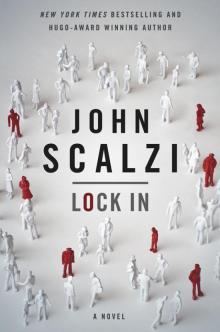 Lock In
Lock In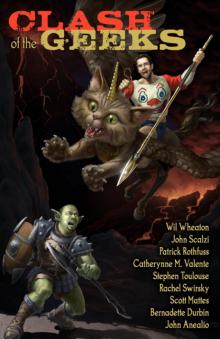 Clash of the Geeks
Clash of the Geeks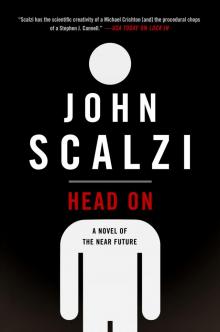 Head On
Head On The Dog King
The Dog King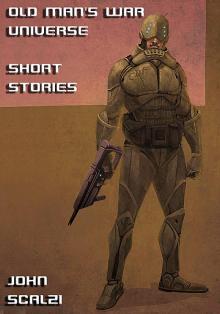 Old Man's War Universe: Short Stories
Old Man's War Universe: Short Stories The End of All Things
The End of All Things Tales From the Clarke
Tales From the Clarke The Human Division
The Human Division The Android's Dream
The Android's Dream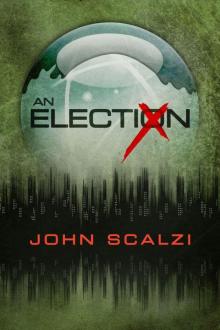 An Election
An Election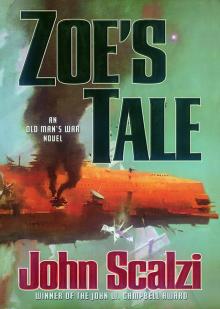 Zoe's Tale
Zoe's Tale Agent to the Stars
Agent to the Stars This Hollow Union
This Hollow Union The Gentle Art of Cracking Heads
The Gentle Art of Cracking Heads Old Man's War
Old Man's War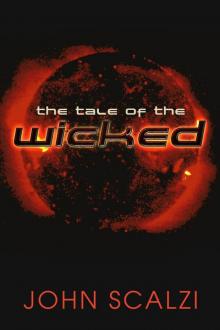 The Tale of the Wicked
The Tale of the Wicked Your Hate Mail Will Be Graded: A Decade of Whatever, 1998-2008
Your Hate Mail Will Be Graded: A Decade of Whatever, 1998-2008 Judge Sn Goes Golfing
Judge Sn Goes Golfing The Back Channel
The Back Channel The Human Division 0.5 - After the Coup
The Human Division 0.5 - After the Coup Fuzzy Nation
Fuzzy Nation The Observers
The Observers This Must Be the Place
This Must Be the Place The Last Colony
The Last Colony Unlocked: An Oral History of Haden's Syndrome
Unlocked: An Oral History of Haden's Syndrome A Voice in the Wilderness
A Voice in the Wilderness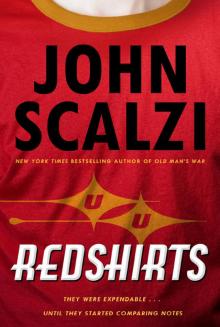 Redshirts
Redshirts The Collapsing Empire
The Collapsing Empire The Last Emperox
The Last Emperox The God Engines
The God Engines A Problem of Proportion
A Problem of Proportion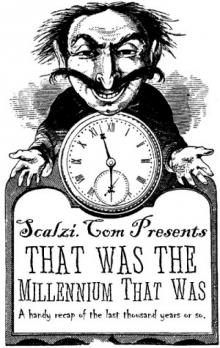 THAT WAS THE MILLENIUM THAT WAS
THAT WAS THE MILLENIUM THAT WAS The B-Team
The B-Team The Sound of Rebellion
The Sound of Rebellion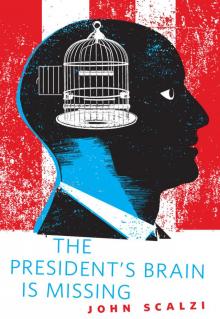 The President's Brain Is Missing
The President's Brain Is Missing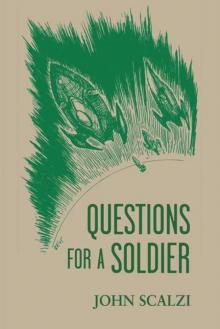 Questions for a Soldier
Questions for a Soldier Walk the Plank
Walk the Plank We Only Need the Heads
We Only Need the Heads How I Proposed to My Wife: An Alien Sex Story
How I Proposed to My Wife: An Alien Sex Story Earth Below, Sky Above
Earth Below, Sky Above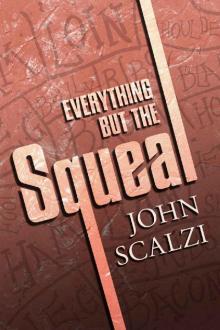 Everything but the Squeal
Everything but the Squeal Old Man’s War
Old Man’s War The Human Division #12: The Gentle Art of Cracking Heads
The Human Division #12: The Gentle Art of Cracking Heads This Must Be the Place thd-10
This Must Be the Place thd-10 A Voice in the Wilderness thd-4
A Voice in the Wilderness thd-4 The Observers thd-9
The Observers thd-9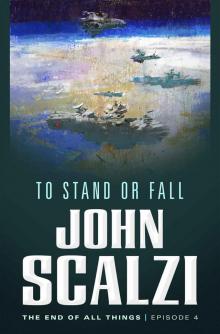 The End of All Things: The Fourth Instalment
The End of All Things: The Fourth Instalment Earth Below, Sky Above thd-13
Earth Below, Sky Above thd-13 Zoe`s Tale вбиос-4
Zoe`s Tale вбиос-4 After the Coup
After the Coup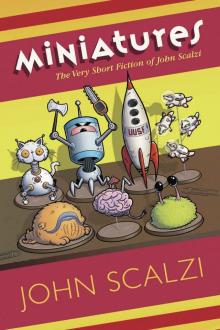 Miniatures: The Very Short Fiction of John Scalzi
Miniatures: The Very Short Fiction of John Scalzi The Last Colony вбиос-3
The Last Colony вбиос-3 Tales From the Clarke thd-5
Tales From the Clarke thd-5 Old Man's War omw-1
Old Man's War omw-1 The Human Division #8: The Sound of Rebellion
The Human Division #8: The Sound of Rebellion The Ghost Brigades omw-2
The Ghost Brigades omw-2 The Sagan Diary (old man's war)
The Sagan Diary (old man's war) The Sound of Rebellion thd-8
The Sound of Rebellion thd-8 The Human Division 13 - Earth Below, Sky Above
The Human Division 13 - Earth Below, Sky Above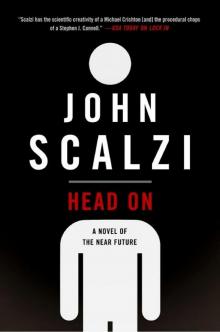 Head On_A Novel of the Near Future
Head On_A Novel of the Near Future The End of All Things: The First Instalment
The End of All Things: The First Instalment The B-Team thd-1
The B-Team thd-1 The Back Channel thd-6
The Back Channel thd-6 Walk the Plank thd-2
Walk the Plank thd-2 The Human Division #9: The Observers
The Human Division #9: The Observers The End of All Things: The Third Instalment
The End of All Things: The Third Instalment The Human Division #10: This Must Be the Place
The Human Division #10: This Must Be the Place The End of All Things #2: This Hollow Union
The End of All Things #2: This Hollow Union We Only Need the Heads thd-3
We Only Need the Heads thd-3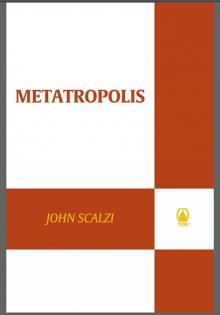 Metatropolis
Metatropolis The Dog King thd-7
The Dog King thd-7 The Consuming Fire (The Interdependency)
The Consuming Fire (The Interdependency) The Human Division #11: A Problem of Proportion
The Human Division #11: A Problem of Proportion